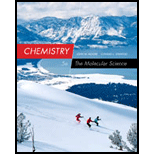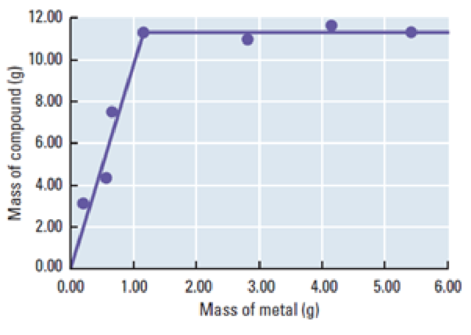
Chemistry: The Molecular Science
5th Edition
ISBN: 9781285199047
Author: John W. Moore, Conrad L. Stanitski
Publisher: Cengage Learning
expand_more
expand_more
format_list_bulleted
Textbook Question
Chapter 3, Problem 126QRT
A weighed sample of a metal is added to liquid bromine and allowed to react completely. The product substance is then separated from any leftover reactants and weighed. This experiment is repeated with several masses of the metal but with the same volume of bromine. This graph indicates the results. Explain why the graph has the shape that it does.

Expert Solution & Answer
Trending nowThis is a popular solution!

Students have asked these similar questions
(f) SO:
Best Lewis Structure
3
e group geometry:_
shape/molecular geometry:,
(g) CF2CF2
Best Lewis Structure
polarity:
e group arrangement:_
shape/molecular geometry:
(h) (NH4)2SO4
Best Lewis Structure
polarity:
e group arrangement:
shape/molecular geometry:
polarity:
Sketch (with angles):
Sketch (with angles):
Sketch (with angles):
1.
Problem Set 3b
Chem 141
For each of the following compounds draw the BEST Lewis Structure then sketch the molecule (showing
bond angles). Identify (i) electron group geometry (ii) shape around EACH central atom (iii) whether the
molecule is polar or non-polar (iv)
(a) SeF4
Best Lewis Structure
e group arrangement:_
shape/molecular geometry:
polarity:
(b) AsOBr3
Best Lewis Structure
e group arrangement:_
shape/molecular geometry:
polarity:
Sketch (with angles):
Sketch (with angles):
(c) SOCI
Best Lewis Structure
2
e group arrangement:
shape/molecular geometry:_
(d) PCls
Best Lewis Structure
polarity:
e group geometry:_
shape/molecular geometry:_
(e) Ba(BrO2):
Best Lewis Structure
polarity:
e group arrangement:
shape/molecular geometry:
polarity:
Sketch (with angles):
Sketch (with angles):
Sketch (with angles):
Chapter 3 Solutions
Chemistry: The Molecular Science
Ch. 3.1 - When washing soda, Na2CO3, reacts with sulfuric...Ch. 3.2 - When sprayed into the flame of a torch, powdered...Ch. 3.2 - Prob. 3.1PSPCh. 3.2 - Prob. 3.2PSPCh. 3.3 - Prob. 3.3PSPCh. 3.3 - Prob. 3.4PSPCh. 3.3 - Prob. 3.5PSPCh. 3.3 - Prob. 3.6PSPCh. 3.3 - Prob. 3.3CECh. 3.4 - Phosphoric acid, H3PO4, has three protons that can...
Ch. 3.4 - Prob. 3.5CECh. 3.4 - Look back through the discussion of electrolytes...Ch. 3.4 - Prob. 3.8PSPCh. 3.4 - Prob. 3.9PSPCh. 3.4 - Write a balanced equation for the reaction of...Ch. 3.4 - Prob. 3.6ECh. 3.4 - Prob. 3.7ECh. 3.4 - Prob. 3.8ECh. 3.4 - Prob. 3.9CECh. 3.4 - Prob. 3.10CECh. 3.5 - Prob. 3.11CECh. 3.5 - Prob. 3.12CECh. 3.5 - Prob. 3.13ECh. 3.5 - Prob. 3.11PSPCh. 3.5 - Prob. 3.12PSPCh. 3.5 - Prob. 3.14CECh. 3.6 - Prob. 3.15CECh. 3.6 - Prob. 3.16ECh. 3.6 - Prob. 3.13PSPCh. 3.6 - Prob. 3.17ECh. 3.6 - Prob. 3.14PSPCh. 3.7 - Prob. 3.15PSPCh. 3.7 - Using the same reaction, calculate the mass of...Ch. 3.7 - At high temperatures, silicon dioxide reacts with...Ch. 3.7 - Urea is used as a fertilizer because it can react...Ch. 3.8 - Assume the methanol synthesis has an 85.0% yield...Ch. 3.8 - Prob. 3.19PSPCh. 3.8 - Prob. 3.19ECh. 3.8 - Prob. 3.20ECh. 3.9 - Phenol is a compound of carbon, hydrogen, and...Ch. 3.9 - Calcium carbonate forms carbon dioxide and calcium...Ch. 3.10 - Prob. 3.20PSPCh. 3.10 - Prob. 3.23ECh. 3.10 - Prob. 3.24ECh. 3.10 - Prob. 3.25CECh. 3.10 - Describe how you would prepare each solution.
1.00...Ch. 3.10 - Prob. 3.26ECh. 3.10 - Prob. 3.22PSPCh. 3.10 - Prob. 3.27CECh. 3.11 - Prob. 3.23PSPCh. 3.11 - Prob. 3.24PSPCh. 3.11 - Sodium chloride is used in intravenous solutions...Ch. 3.12 - Show that the reaction of KMnO4 with H2O2 is a...Ch. 3.12 - Prob. 3.25PSPCh. 3 - Aqueous solutions of ammonium sulfide and...Ch. 3 - In a blast furnace at high temperature, iron(III)...Ch. 3 - What information does a balanced chemical equation...Ch. 3 - Prob. 2QRTCh. 3 - Prob. 3QRTCh. 3 - Prob. 4QRTCh. 3 - Prob. 5QRTCh. 3 - Prob. 6QRTCh. 3 - When asked, “What is the limiting reactant?” you...Ch. 3 - Prob. 8QRTCh. 3 - Prob. 9QRTCh. 3 - For this reaction, fill in the table with the...Ch. 3 - Prob. 11QRTCh. 3 - Prob. 12QRTCh. 3 - This diagram shows A (blue spheres) reacting with...Ch. 3 - Prob. 14QRTCh. 3 - Prob. 15QRTCh. 3 - Prob. 16QRTCh. 3 - Prob. 17QRTCh. 3 - Prob. 18QRTCh. 3 - Prob. 19QRTCh. 3 - Balance these equations. (a) UO2(s) + HF() UF4(s)...Ch. 3 - Prob. 21QRTCh. 3 - Prob. 22QRTCh. 3 - Prob. 23QRTCh. 3 - Balance these combustion reactions. (a) C6H12O6 +...Ch. 3 - Prob. 25QRTCh. 3 - Prob. 26QRTCh. 3 - Prob. 27QRTCh. 3 - Which substance conducts electricity when...Ch. 3 - Prob. 29QRTCh. 3 - Predict whether each compound is soluble in water....Ch. 3 - Prob. 31QRTCh. 3 - Which drawing is the best nanoscale representation...Ch. 3 - If aqueous solutions of potassium carbonate and...Ch. 3 - If aqueous solutions of potassium sulfide and...Ch. 3 - Prob. 35QRTCh. 3 - Prob. 36QRTCh. 3 - Prob. 37QRTCh. 3 - Prob. 38QRTCh. 3 - Prob. 39QRTCh. 3 - Prob. 40QRTCh. 3 - Prob. 41QRTCh. 3 - Prob. 42QRTCh. 3 - Prob. 43QRTCh. 3 - Prob. 44QRTCh. 3 - Prob. 45QRTCh. 3 - Prob. 46QRTCh. 3 - Prob. 47QRTCh. 3 - Prob. 48QRTCh. 3 - Prob. 49QRTCh. 3 - Prob. 50QRTCh. 3 - Prob. 51QRTCh. 3 - Prob. 52QRTCh. 3 - Prob. 53QRTCh. 3 - Prob. 54QRTCh. 3 - Prob. 55QRTCh. 3 - Prob. 56QRTCh. 3 - Prob. 57QRTCh. 3 - Prob. 58QRTCh. 3 - Nitrogen monoxide is oxidized in air to give brown...Ch. 3 - Prob. 60QRTCh. 3 - The final step in the manufacture of platinum...Ch. 3 - Disulfur dichloride, S2Cl2, is used to vulcanize...Ch. 3 - Prob. 63QRTCh. 3 - Prob. 64QRTCh. 3 - Prob. 65QRTCh. 3 - Prob. 66QRTCh. 3 - Prob. 67QRTCh. 3 - Cisplatin, Pt(NH3)2Cl2, a drug used in the...Ch. 3 - Aluminum chloride, Al2Cl6, is an inexpensive...Ch. 3 - Prob. 70QRTCh. 3 - Prob. 71QRTCh. 3 - Prob. 72QRTCh. 3 - Prob. 73QRTCh. 3 - Quicklime, CaO, is formed when calcium hydroxide...Ch. 3 - Prob. 75QRTCh. 3 - Disulfur dichloride, which has a revolting smell,...Ch. 3 - Prob. 77QRTCh. 3 - Prob. 78QRTCh. 3 - Quinone, which is used in the dye industry and in...Ch. 3 - l-Dopa is a drug used for the treatment of...Ch. 3 - Write the balanced chemical equation for the...Ch. 3 - Prob. 82QRTCh. 3 - Prob. 83QRTCh. 3 - Prob. 84QRTCh. 3 - Prob. 85QRTCh. 3 - Prob. 86QRTCh. 3 - You need 300. mL of 0.500-M K2Cr2O7. Which method...Ch. 3 - You need to make a 0.300-M solution of NiSO4(aq)....Ch. 3 - You wish to make a 0.200-M solution of CuSO4(aq)....Ch. 3 - Prob. 90QRTCh. 3 - Prob. 91QRTCh. 3 - You mix 25.0 mL of 0.234-M FeCl3 solution with...Ch. 3 - A soft drink contains an unknown mass of citric...Ch. 3 - Prob. 94QRTCh. 3 - Prob. 95QRTCh. 3 - Potassium hydrogen phthalate, KHC8H4O4, is used to...Ch. 3 - Prob. 97QRTCh. 3 - Prob. 98QRTCh. 3 - Prob. 99QRTCh. 3 - Prob. 100QRTCh. 3 - Boron forms an extensive series of compounds with...Ch. 3 - Prob. 102QRTCh. 3 - Prob. 103QRTCh. 3 - Prob. 104QRTCh. 3 - Prob. 105QRTCh. 3 - Azurite is a copper-containing mineral that often...Ch. 3 - Prob. 107QRTCh. 3 - Prob. 108QRTCh. 3 - Vitamin C is ascorbic acid, HC6H7O6, which can be...Ch. 3 - Prob. 110QRTCh. 3 - Prob. 111QRTCh. 3 - Prob. 112QRTCh. 3 - Prob. 113QRTCh. 3 - Prob. 114QRTCh. 3 - Prob. 115QRTCh. 3 - Prob. 116QRTCh. 3 - Prob. 117QRTCh. 3 - Prob. 118QRTCh. 3 - Prob. 119QRTCh. 3 - Prob. 120QRTCh. 3 - Ammonia can be formed by a direct reaction of...Ch. 3 - Carbon monoxide burns readily in oxygen to form...Ch. 3 - Prob. 123QRTCh. 3 - Write a balanced chemical equation that represents...Ch. 3 - A student set up an experiment for six different...Ch. 3 - A weighed sample of a metal is added to liquid...Ch. 3 - Prob. 127QRTCh. 3 - Prob. 128QRTCh. 3 - Each box represents a tiny volume in an aqueous...Ch. 3 - Consider the chemical reaction 2 S + 3 O2 → 2 SO3....Ch. 3 - Prob. 131QRTCh. 3 - Prob. 132QRTCh. 3 - Prob. 133QRTCh. 3 - Prob. 134QRTCh. 3 - Prob. 135QRTCh. 3 - Prob. 136QRTCh. 3 - Prob. 137QRTCh. 3 - Prob. 138QRTCh. 3 - Prob. 139QRTCh. 3 - Prob. 140QRTCh. 3 - Prob. 141QRTCh. 3 - Prob. 142QRTCh. 3 - In a reaction, 1.2 g element A reacts with exactly...Ch. 3 - Prob. 144QRTCh. 3 - When solutions of silver nitrate and sodium...Ch. 3 - Nickel metal reacts with aqueous silver nitrate in...Ch. 3 - Prob. 147QRTCh. 3 - Prob. 148QRTCh. 3 - Prob. 149QRTCh. 3 - Prob. 150QRTCh. 3 - A mountain lake that is 4.0 km × 6.0 km with an...Ch. 3 - Prob. 152QRTCh. 3 - Prob. 153QRTCh. 3 - Prob. 154QRTCh. 3 - Prob. 155QRTCh. 3 - Ethanol, C2H5OH, is a gasoline additive that can...Ch. 3 - Prob. 157QRTCh. 3 - Prob. 3.ACPCh. 3 - Prob. 3.BCPCh. 3 - Prob. 3.DCPCh. 3 - Prob. 3.ECPCh. 3 - Prob. 3.FCPCh. 3 - Prob. 3.GCP
Knowledge Booster
Learn more about
Need a deep-dive on the concept behind this application? Look no further. Learn more about this topic, chemistry and related others by exploring similar questions and additional content below.Similar questions
arrow_back_ios
SEE MORE QUESTIONS
arrow_forward_ios
Recommended textbooks for you
 Living By Chemistry: First Edition TextbookChemistryISBN:9781559539418Author:Angelica StacyPublisher:MAC HIGHER
Living By Chemistry: First Edition TextbookChemistryISBN:9781559539418Author:Angelica StacyPublisher:MAC HIGHER Chemistry: The Molecular ScienceChemistryISBN:9781285199047Author:John W. Moore, Conrad L. StanitskiPublisher:Cengage Learning
Chemistry: The Molecular ScienceChemistryISBN:9781285199047Author:John W. Moore, Conrad L. StanitskiPublisher:Cengage Learning Chemistry for Engineering StudentsChemistryISBN:9781337398909Author:Lawrence S. Brown, Tom HolmePublisher:Cengage Learning
Chemistry for Engineering StudentsChemistryISBN:9781337398909Author:Lawrence S. Brown, Tom HolmePublisher:Cengage Learning- Chemistry: Matter and ChangeChemistryISBN:9780078746376Author:Dinah Zike, Laurel Dingrando, Nicholas Hainen, Cheryl WistromPublisher:Glencoe/McGraw-Hill School Pub Co
 Introductory Chemistry: A FoundationChemistryISBN:9781337399425Author:Steven S. Zumdahl, Donald J. DeCostePublisher:Cengage Learning
Introductory Chemistry: A FoundationChemistryISBN:9781337399425Author:Steven S. Zumdahl, Donald J. DeCostePublisher:Cengage Learning Chemistry: An Atoms First ApproachChemistryISBN:9781305079243Author:Steven S. Zumdahl, Susan A. ZumdahlPublisher:Cengage Learning
Chemistry: An Atoms First ApproachChemistryISBN:9781305079243Author:Steven S. Zumdahl, Susan A. ZumdahlPublisher:Cengage Learning

Living By Chemistry: First Edition Textbook
Chemistry
ISBN:9781559539418
Author:Angelica Stacy
Publisher:MAC HIGHER

Chemistry: The Molecular Science
Chemistry
ISBN:9781285199047
Author:John W. Moore, Conrad L. Stanitski
Publisher:Cengage Learning

Chemistry for Engineering Students
Chemistry
ISBN:9781337398909
Author:Lawrence S. Brown, Tom Holme
Publisher:Cengage Learning

Chemistry: Matter and Change
Chemistry
ISBN:9780078746376
Author:Dinah Zike, Laurel Dingrando, Nicholas Hainen, Cheryl Wistrom
Publisher:Glencoe/McGraw-Hill School Pub Co

Introductory Chemistry: A Foundation
Chemistry
ISBN:9781337399425
Author:Steven S. Zumdahl, Donald J. DeCoste
Publisher:Cengage Learning

Chemistry: An Atoms First Approach
Chemistry
ISBN:9781305079243
Author:Steven S. Zumdahl, Susan A. Zumdahl
Publisher:Cengage Learning
GCSE Chemistry - Differences Between Compounds, Molecules & Mixtures #3; Author: Cognito;https://www.youtube.com/watch?v=jBDr0mHyc5M;License: Standard YouTube License, CC-BY